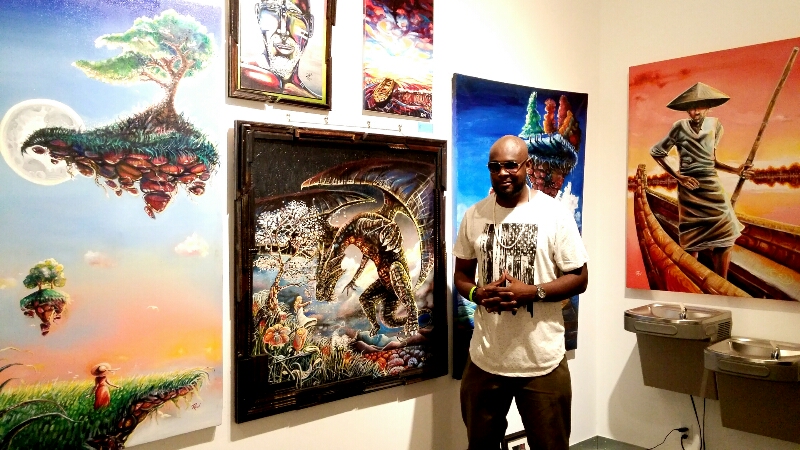There is so much talent within the arts but many times only entertainment artists get the attention. We had the opportunity to interview Ralph “rEN” Dillard, who is a visual artist in Atlanta. Learn more about his inspiration, artwork and why he is a Quintessential Gentleman below.
How are your roots infused with your current work?
Philadelphia and Atlanta are both very magical places for very different reasons. Philadelphia’s creative element has a more mature, aware, and sophisticated texture to it. Because of that Philly has a sort of nurturing vibe to it. I think Atlanta is special because everything feels so raw and electric. People are not as generally aware of things involving fine art so to me that represents an opportunity. I have always seen myself as kind of a Robin Hood type personality. I love the idea of my work being so many peoples first introduction to fine art. You get the feeling that Atlanta’s best days are ahead of her. It just feels like the right place to be right now.

What is that special part of you that we can see in all of your artwork?
Three painters who have always inspired me are Alex Grey, Bo Bartlett, and Slavador Dali. I have gone to all three of their museums and studied their works for years. I would sit and stare at their paintings for hours simply trying to capture everything. I remember thinking that at the very least, I never want my paintings to bore people. This is the first generation of painters in recorded history that has competed with so many other colorful, vibrant, and interesting rectangles. Most of them even glow! If you think about it, you have mobile phones, tablets, laptops, desktops, all varieties of flat screens, silver screens, big screens, billboards etc… all competing for attention alongside your painting. I think that forces the traditional visual artist to bring it on some next level s***. To me, the worse insult is a nonchalant glance. I think my work at least holds your attention for long enough for the viewers to make some decisions about what it means to them.

Being an artist, how important is it to not only reflect how you feel in your art but all the times we currently live in?
I am not sure they are mutually exclusive. As an artist tells his or her story, I think the artist simultaneously tells the story of the time in which they live to an exact degree. As authentically as you can tell your story, you give more detail about what it was like to be alive during that time period. The two are really inseparable.

You have multiples series for your work, how do you come up with them?
My first retrospective solo show back in 2016 was titled “The Art of Unlearning”. The Art of Unlearning is sort of a compass or over-arching theme for all of my work. I consider myself a philosopher. All of my life I have always sought out the true meanings behind things as we see them. Whenever I have a new philosophical discover or realization, I tried to infuse it into my work visually a s much as possible. Music, audiobooks, comedy specials, I love having a wide variety of things going all at once in my studio. Some of it makes it into the work – a lot doesn’t.

What inspires you to be a Quintessential Gentleman.
My artist name is “rEN”. “rEN” is short for Renazance which is a play on the phrase “renaissance man”. A Renaissance man is known for simply having broad interests or superficial knowledge in several fields, the individual possesses a more profound knowledge and a proficiency, or even an expertise, in at least some of those fields. A Renaissance man is also a person who is “enlightened” in all subject matter including arts, math, athletics, philosophy, music, history, and any other cultural aspect of society. I don’t think being a quintessential gentleman differs much from being a renaissance man. Essentially every religion advises that we ultimately learn to “know ourselves”. The gentlemen and the renaissance man are experts in that arena.

When you think of a legacy, how do you feel your art reflects that?
It is said that most artists chief concern centers around escaping death. I think establishing a real legacy is a valid way to accomplish that aim. Hopefully, people will examine and become inspired by my work long after I have transitioned. All I can hope is to get better at communicating my philosophical ideas into works of art. Helping people to ultimately unlearn all of these things that we do on auto-pilot without much critical thought is important to me, I consider it my life’s work. Accomplishing that mission is legacy enough for me.
Make sure to follow rEN on Instagram, Facebook and his website.




